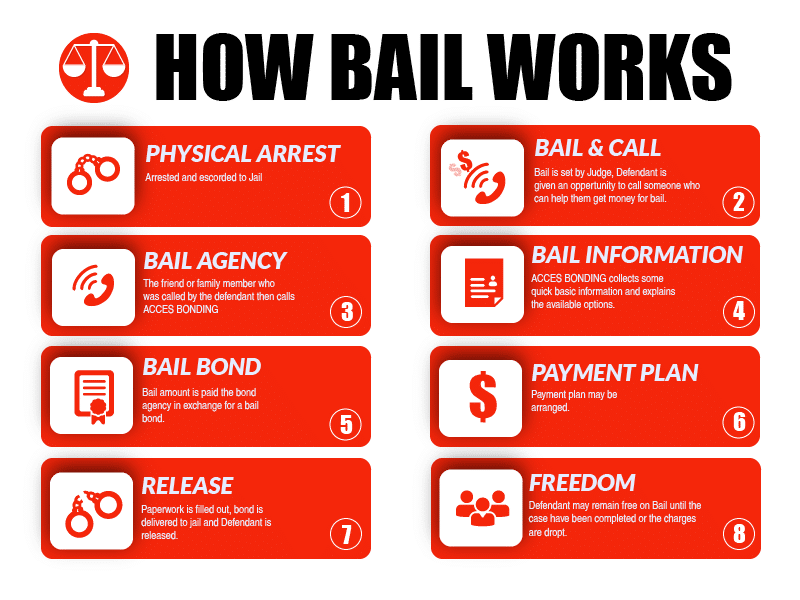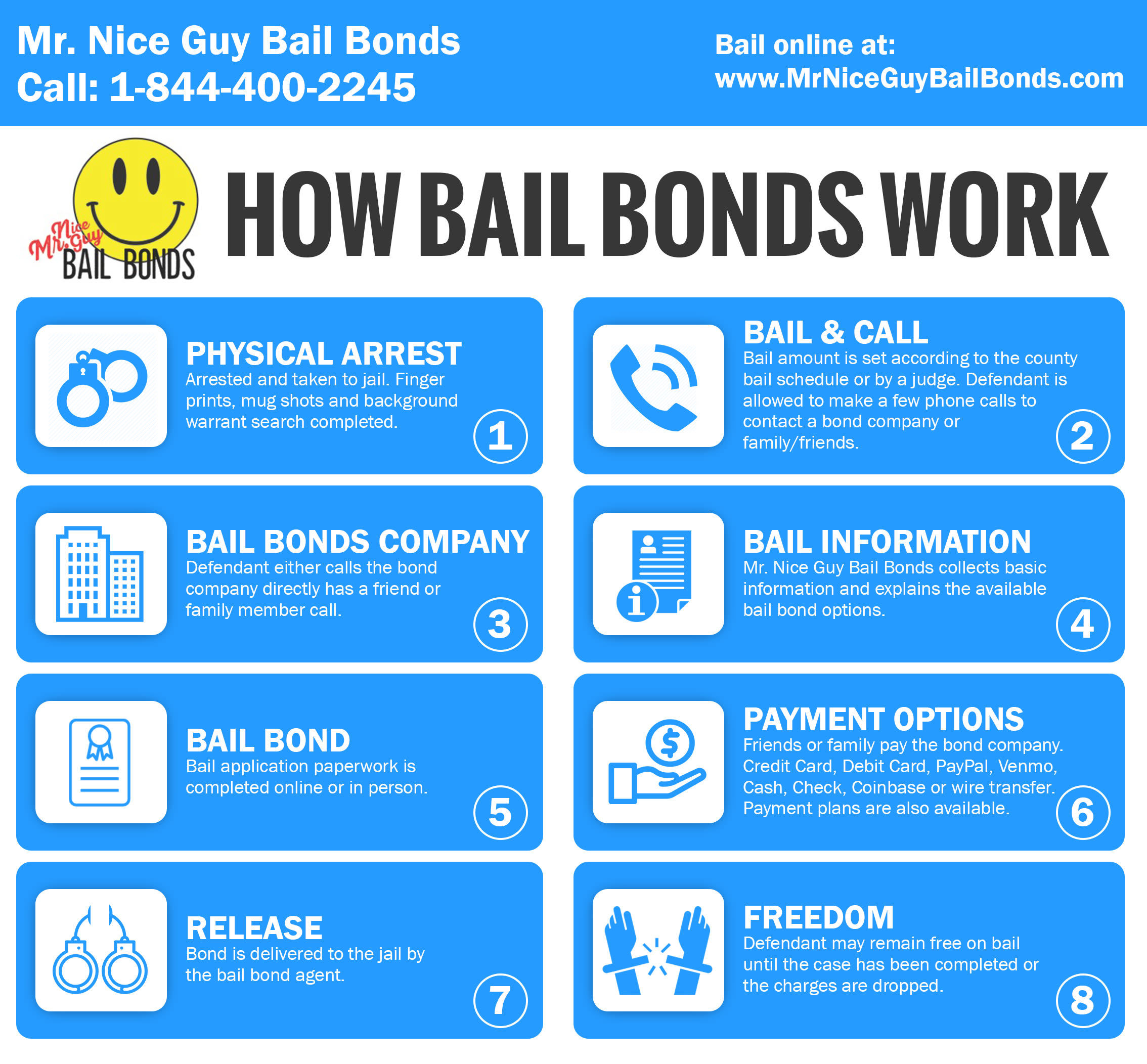Unlocking the Secrets of Bail Bonds: A Comprehensive Review
Navigating the elaborate globe of Bail bonds can usually seem like deciphering a cryptic code, with layers of complexity that stay hidden to lots of. From the numerous sorts of Bail bonds readily available to the pivotal role of a co-signer, each component plays an important component in this lawful procedure. As we unwind the internet of details bordering Bail bonds, a more clear understanding arises, clarifying the devices that underpin this system. Join us as we delve deeper into the nuanced facets of Bail bonds, uncovering the secrets that lie within and demystifying this commonly nontransparent realm.
Comprehending Bail Bonds Process
When facing a lawful scenario that calls for publishing Bail, comprehending the Bail bonds process is essential to navigate the complexities of the judicial system effectively. Bail bonds function as an economic assurance to the court that the offender will certainly stand for all required court looks. This procedure includes a bail bondsman, that commonly bills a non-refundable cost, generally around 10% of the overall Bail amount, to upload the Bail on part of the defendant.

Additionally, collateral, such as home or possessions, might be needed to safeguard the bail bond. Understanding the terms of the bail bond arrangement is vital to make certain conformity and stay clear of any type of added legal consequences. By understanding the Bail bonds process, individuals can make informed choices when navigating the lawful system.
Kinds of Bail Bonds Available
Various kinds of Bail bonds are available to people facing lawful process, using options tailored to details scenarios and demands. One of the most common type is a guaranty bond, where a bail bondsman pays the full Bail quantity in support of the offender in exchange for a non-refundable charge, usually around 10% of the overall Bail. Cash money bonds require the complete Bail quantity to be paid in cash before the offender can be released. Home bonds, on the various other hand, involve utilizing useful assets like realty as security for the Bail quantity.
Additionally, there are federal Bail bonds for cases including government fees and migration bonds for people detained by Immigration and Traditions Enforcement (ICE) Recognizing the numerous types of Bail bonds offered can help defendants navigate the lawful procedure a lot more successfully.
Responsibilities of the Co-Signer

In addition, as a co-signer, you are responsible for guaranteeing that the offender follows any kind of conditions established by the court, such as attending therapy or refraining from specific activities. It is crucial to maintain open communication with the offender to check their conformity and deal with any kind of issues without delay. Ultimately, being a co-signer entails a substantial level of trust fund and responsibility, as you are financially and legally connected to the offender's Bail responsibilities.
Effects of Skipping Bail

Missing Bail can have major lawful effects for both the co-signer and the defendant included in the bail bond arrangement. When an accused falls short to show up in court as called for after posting Bail, the court normally issues a warrant for more tips here their arrest. This not just exacerbates the accused's lawful concerns yet also puts the co-signer in danger.
For the accused, missing Bail can lead to extra criminal fees, such as ridicule of court or Bail leaping, which can lead to penalties, a cancellation of Bail advantages, or perhaps imprisonment. Furthermore, the defendant might shed the Bail quantity paid and any kind of security provided.
Co-signers also deal with substantial effects if the accused avoids Bail. As the co-signer assures the offender's look in court and is monetarily accountable for the full Bail amount, they may be called for to pay the entire Bail if the offender absconds. This can bring about financial pressure, damaged credit, and potential legal activity versus the co-signer.
Key Factors in Bail Bond Authorization
More severe offenses may lead to higher Bail quantities or also a rejection of Bail altogether. A background of previous convictions or a pattern of avoiding court days can elevate red flags and make it more challenging to secure a bail bond.
Additionally, the connections the offender needs to the community can influence the approval of a bail bond. Strong area connections, such as stable employment, family members connections, and long-lasting residency, can function in favor of the index offender. On the various other hand, flight risk concerns may occur if the accused has no solid links to the neighborhood. Monetary resources likewise play a substantial role. The ability to pay the Bail quantity or give security can raise the chances of bail bond approval. Eventually, a combination of these factors is weighed by the court when establishing whether to approve a bail bond.
Conclusion
In final thought, comprehending the Bail bonds process, the kinds readily available, the responsibilities of the co-signer, the effects of missing Bail, and the vital consider bail bond authorization are vital for navigating the lawful system. By acquainting oneself with these facets, people can make informed decisions and guarantee a smoother process when dealing with Bail bonds. It is necessary to adhere to the requirements and guidelines established forth to stay clear of any kind of potential issues.
The most usual type is a surety bond, where a bond bondsman pays the full Bail quantity on behalf of the accused in exchange for a non-refundable fee, usually around 10% of the complete Bail. By signing the bail bond agreement, you check that are taking on the obligation of ensuring the complete Bail amount if the defendant stops working to appear in court - 24 hour bail bonds dayton ohio.Avoiding Bail can have major lawful consequences for both the defendant and the co-signer entailed in the bail bond contract. The capacity to pay the Bail quantity or supply collateral can boost the chances of bail bond authorization.In conclusion, comprehending the Bail bonds process, the types available, the duties of the co-signer, the consequences of skipping Bail, and the vital variables in bail bond approval are crucial for navigating the legal system